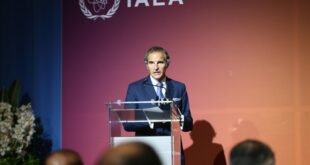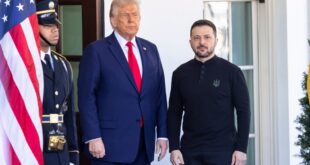There is a pressing need to establish a Middle East regional security structure in partnership with the major global powers, in accordance with new global and regional realities and with a clear set of rules to organize relations between the regional powers.
The general belief in the West that Arabs could not do without security arrangements with their allies like the US, UK and France was correct in general. Yet, a slow process of modifications in the relative weights of the components of this percept has already been going on for some time now. The process was triggered by the changes in the global order and the ongoing changes in the relative weights of its components.
This creates the dilemma which faces most of the region’s countries at present. The moment the US rephrased its commitment to the security of the region or was perceived to be doing so, the region’s countries felt vulnerable and started their search for an alternative strategy. It was a process destined to happen anyway, regardless of particular policies in particular countries. Leaders can make this shift either organized or abrupt, smooth or rough.
And what we see is a mixture of all this. Never before, since the Second World War, have we seen the grounds for a real shift in US relations with its Arab allies. Why is this a problem? It is a problem because it misses a principle element. If such a shift is destined to happen due to whatever objective trends, it better happens in coordination and agreement between the two allied sides based on an understanding that it is simply fact of life, everything changes including the limits of power.
Yet, the divergence between the US and the Arabs did not happen in any organized fashion. Furthermore, it came in a critical moment in the evolution of regional threats. Worst of all, it was due precisely to the overture between the Arab’s traditional ally and their main foe, Iran, which is perceived in the region as the number one threat to regional security. The Arabs not only saw their main partner in regional security waver, they also believed that they see this main ally inching towards a power they consider the first threat to their region.
This gave us what we saw as a sense of disbelief in the Middle East during the Obama years. It was not the Arab’s fault that George W Bush invaded Iraq, In fact, they opposed that unequivocally. But they had to pay the price for the Bush blunders in the form of Obama’s policies.
In any case, this divergence between many regional powers and their old friend: the US, the abrupt way it happened, was destined to create a new set of problems. Look at the case of Turkey for example, though it is not Arab. Changes occurred in Turkey as much as they occurred in the US global balance structure. The result is disarray and a feverish rush to address national security threats on unilateral bases. If not for the objective necessities of NATO and the inherited restrains and rules of the alliance, one would see Turkey and the US in two different camps for the first time since the beginning of the 50’s. Turkey and the US are currently allies only in name.
But the shift is happening in a way that will entail strategic consequences for the US too. Vacuum is always filled somehow by someone coming from somewhere. And as it stands in the region now, this someone has a name: Vladimir Putin.
Needless to say that the US and its allies in the region have to engage in an in depth search for bases which are able to accommodate the changes that occurred in the last 60 plus years. And needless to say that, for the sake of both the US and the Middle East, this search has to be based on mutual understanding of the limits objectively set on the role of each player, particularly the US, and the best, smoothest, and less bumpy recalibration in both sides and a real understanding of the concerns and threats particularly those faced by the GCC countries. If not, we will see the case of, say, Turkey, a country that will kick and resist but ultimately will have to find a “modus vivendi” with Putin.
Dismantling the US security alliances in the Middle East is done in the most amateurish of ways. It is done with disregard to the fact that a major shift in one spot entails forced shifts in another and another. For the base of an alliance remains in mutual trust and confidence of the commitment of its parties. The US “recalibrated” and shifted its commitments in the Gulf and opened up to Iran. This policy was coupled with running out of Iraq after destroying it, then standing on the sideline in Syria while it is burning, and setting Libya in fire then playing the deaf, and the list goes on. These are no legacies for any president. These are fiascos.
We have seen many formal “dialogues” between the two sides. Yet, if these dialogues were enough, we would not have seen the frequent outburst of thinly veiled disputes between the two sides. For a strategic dialogue is based mainly not upon formalities, but upon trust and confidence followed by strategic clearness, frankness in explaining the limits of cooperation and the ablity to organize high level permeant consultations.
As every similar organization, the GCC has its internal divergences and differences. This is not unique to the GCC. The EU has ten times more problems. But the group proved over and over again that when any of its members is threatened, it is ready to close ranks and work together as one. This was clear in the tragic story of invading Kuwait in 1991. It was evident again as recent as March 2011 when GCC forces were deployed in Bahrain to confront what was perceived as an Iranian asymmetric operation. An Arab coalition declared war in Yemen almost exactly four years later in response to what was thought to be an insurgency supported by Iran’s IRGC.
The game to shape the future of the Middle East should not be allowed to evolve uncontrolled the way it is currently playing out. The disparity in the structure of available tools between the regional players, the charged environment in the current transitional process in the region and the heightened levels of distrust and insecurity promise future attempts to respond to asymmetric warfare through conventional warfare.
Disarray, over-suspicions, conflicts between individual agendas and collective regional security considerations and the emotionally charged atmosphere call for an active global-regional moves to set a new regional security structure. If things are left where they currently are, we will certainly end up with more chaos, terrorism, radicalization and potentially a regional war.
Objectively, the perception that the US reduced its security commitments has been widely circulating in the region. True or exaggerated, this should have provided an ideal opportunity to start thinking of replacing these commitments with a global-regional security structure that compensate for any decreasing US role, true or imaginative. In other words, ways have to be found to organize US global retreat. President Obama may have been a reflection of an end of a phase in US global role. If he indeed was, the shift should have been organized by the US, something like “We are reducing our role now guys for whatever reasons of our own. Let us see together how best we can make the shift to slower gears in the smoothest way possible. Let us see your concerns, and let us explain ours”. Nothing of that kind happened. For his credit, former Chairman of JCS General Dempsey tried to raise this issue to be met with a shallow administration in strategy, clever only in spinning and playing politics.
It is not ultimately in the interest of the US to keep the envelope of commitments it cannot actively fill if circumstances call for actions.
Naturally, agendas of different powers in the Middle East will never be identical. At times, they will be conflicting. There will always be differences, disputes and challenges. The region, on its own, and particularly in its present conditions, cannot reach a common “bylaws” to regulate its conflicts. Due to the geographic location of the Middle East, the world should not risk staying on the sideline as a mere spectator. Too little too late gave us a growing Syrian crisis, an Iraqi crisis in the perpetual making, a Libyan almost hopeless crisis, a war in Yemen, a growing barbaric forces borrowing religious gowns, and the horror of terrorism. No one should content himself with the role of the observer while the area explodes in fire. Shrapnel will hit far beyond its borders.
 Geostrategic Media Political Commentary, Analysis, Security, Defense
Geostrategic Media Political Commentary, Analysis, Security, Defense





